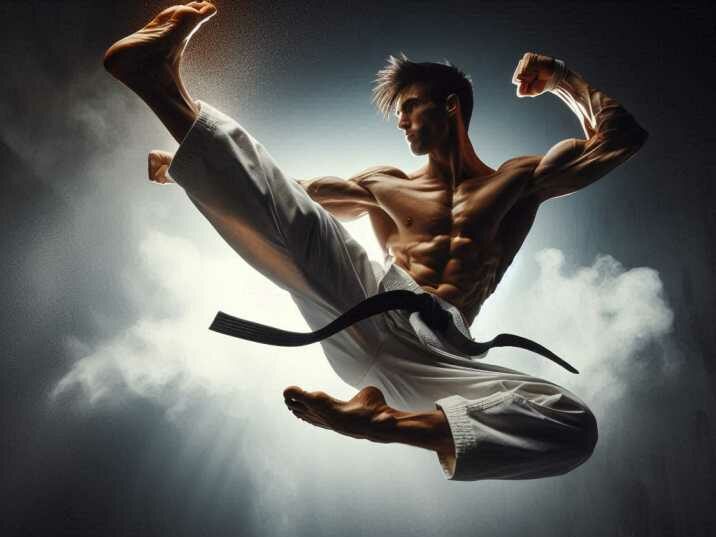Introduction
Table of Contents
Are you looking to boost your physical health, mental strength, and overall well-being? Martial arts might be the answer you’re seeking. This ancient practice offers countless benefits for people of all ages and backgrounds. In this blog post, we will explore why martial arts are important and how they can positively impact your life. From physical fitness to self-discipline and self-defense, martial arts provide a holistic approach to personal development. Read on to learn more about the importance of martial arts and how they can help you become the best version of yourself.

Physical Fitness and Health Importance of Martial Arts
Improved Cardiovascular Health
Engaging in martial arts helps improve cardiovascular health by increasing heart rate and promoting better blood circulation. Practicing various techniques and drills requires stamina and endurance, which strengthens the heart and lungs. Regular martial arts training can lower the risk of heart disease, stroke, and other cardiovascular issues.
Enhanced Strength and Flexibility
Martial arts involve a wide range of movements that work different muscle groups. Kicking, punching, and grappling exercises help build strength, while stretching routines improve flexibility. This combination leads to a well-balanced physique, reducing the risk of injuries and improving overall physical performance.
Weight Management
Martial arts are an excellent way to burn calories and maintain a healthy weight. High-intensity training sessions can help shed excess pounds and boost metabolism. Additionally, the discipline and focus required in martial arts can lead to better eating habits, further supporting weight management goals.
Mental Health Benefits of Martial Arts
Stress Relief
Practicing martial arts provides a healthy outlet for stress and anxiety. The physical exertion helps release endorphins, which are natural mood enhancers. Additionally, the focus and concentration required during training can help clear the mind and promote relaxation.
Improved Focus and Concentration
Martial arts training demands mental sharpness and concentration. Practitioners must stay alert and aware of their surroundings, which helps improve cognitive function. This heightened focus can translate to better performance in other areas of life, such as work or school.
Boosted Self-Esteem and Confidence
Achieving milestones in martial arts, such as mastering a new technique or earning a higher belt rank, can significantly boost self-esteem and confidence. The sense of accomplishment and personal growth gained through martial arts training helps individuals feel more capable and self-assured in their everyday lives.
Self-Defense Skills
Practical Techniques for Safety
One of the primary reasons people take up martial arts is to learn self-defense. Martial arts teach practical techniques for protecting oneself in dangerous situations. Knowing how to defend oneself can provide a sense of security and empowerment, reducing fear and anxiety.
Awareness and Prevention
Martial arts training emphasizes situational awareness and the importance of avoiding conflict whenever possible. By learning to recognize potential threats and dangerous situations, practitioners can take proactive steps to prevent them from escalating.
Non-Violent Conflict Resolution
While martial arts teach physical self-defense techniques, they also emphasize the importance of resolving conflicts peacefully. Practitioners learn to use their skills responsibly and avoid violence unless absolutely necessary. This approach fosters a sense of respect and responsibility towards others.
Discipline and Self-Control
Structured Training Programs
Martial arts schools follow structured training programs that instill discipline and self-control in their students. Regular attendance, punctuality, and adherence to the rules are essential aspects of martial arts practice. This structured environment helps individuals develop a strong sense of responsibility and accountability.
Goal Setting and Achievement
Martial arts training involves setting and achieving specific goals, such as earning a new belt rank or mastering a particular technique. This process teaches the importance of setting realistic goals, working towards them diligently, and celebrating achievements. These skills can be applied to other areas of life, such as career or personal development.
Patience and Perseverance
Progress in martial arts requires patience and perseverance. Developing new skills and techniques takes time and consistent effort. Practitioners learn to push through challenges and setbacks, building resilience and determination. This mindset helps individuals overcome obstacles in other aspects of life.
Building a Sense of Community
Camaraderie and Support
Martial arts schools foster a sense of camaraderie and support among students. Training alongside others who share similar goals creates a strong sense of community and belonging. This supportive environment encourages individuals to push their limits and achieve their best.
Learning from Others
Martial arts practitioners often learn from their peers and instructors. Observing and practicing with others provides valuable insights and feedback, helping individuals improve their skills. This collaborative learning experience fosters mutual respect and appreciation for different abilities and perspectives.
Social Connections
Joining a martial arts school provides opportunities to meet new people and form lasting friendships. The shared experience of training and growth creates strong bonds among practitioners. These social connections can enhance overall well-being and provide a support network outside of training.
Cultural Appreciation
Understanding Martial Arts History
Martial arts have deep cultural and historical roots. Practicing martial arts provides an opportunity to learn about the traditions and philosophies behind different styles. This cultural appreciation fosters a greater understanding and respect for diverse practices and beliefs.
Exposure to Different Cultures
Many martial arts styles originate from different parts of the world, such as Japan, China, Korea, and Brazil. Practicing martial arts exposes individuals to these cultures, promoting global awareness and appreciation. This cultural exchange enriches the training experience and broadens perspectives.
Respect for Tradition
Martial arts emphasize the importance of respecting tradition and honoring the teachings of past masters. Practitioners learn to appreciate the values and principles that have been passed down through generations. This respect for tradition instills a sense of humility and gratitude.
Benefits of Martial Arts for Children
Developing Life Skills
Martial arts training teaches children essential life skills, such as discipline, respect, and perseverance. These skills help them succeed in school, build positive relationships, and overcome challenges. Martial arts provide a foundation for personal growth and character development.
Building Confidence and Self-Esteem
Children who practice martial arts gain confidence and self-esteem through their achievements. The supportive environment and positive reinforcement from instructors and peers help children feel capable and valued. This confidence can positively impact their academic and social lives.
Promoting Physical Activity
Martial arts are an excellent way for children to stay active and healthy. The physical exercise involved in training helps improve strength, coordination, and overall fitness. Encouraging children to participate in martial arts promotes a lifelong habit of physical activity and well-being.
Importance of Martial Arts for Adults
Stress Relief and Mental Clarity
For adults, martial arts provide a healthy outlet for stress and mental clarity. The physical exertion and focus required during training help release tension and promote relaxation. Adults can benefit from the mental and emotional well-being gained through regular martial arts practice.
Physical Fitness and Health
Martial arts are an effective way for adults to stay fit and healthy. The combination of strength training, cardio, and flexibility exercises provides a well-rounded workout. Adults can enjoy improved physical health and vitality through consistent martial arts practice.
Social Interaction and Community
Joining a martial arts school provides adults with opportunities for social interaction and community building. Training alongside others creates a sense of camaraderie and support. These social connections can enhance overall well-being and provide a sense of belonging.
Importance of Martial Arts for Seniors
Maintaining Physical Health
Martial arts can be adapted to suit the needs of seniors, providing a gentle yet effective form of exercise. Training helps maintain physical health by improving strength, flexibility, and balance. Seniors can enjoy a higher quality of life through regular martial arts practice.
Mental Stimulation
Martial arts training provides mental stimulation and cognitive benefits for seniors. Learning new techniques and strategies keeps the mind sharp and engaged. Seniors can experience improved mental clarity and focus through martial arts practice.
Social Engagement
Joining a martial arts school provides seniors with opportunities for social engagement and connection. Training alongside others creates a sense of community and belonging. These social interactions can enhance overall well-being and reduce feelings of isolation.
Importance of Martial Arts for Personal Growth
Self-Discovery
Martial arts provide a path for self-discovery and personal growth. Practitioners gain insights into their strengths and weaknesses, learning to overcome challenges and push their limits. This self-awareness fosters personal development and a deeper understanding of oneself.
Building Resilience
Martial arts training teaches resilience and perseverance. Practitioners learn to face challenges head-on and push through setbacks. This resilience helps individuals overcome obstacles in other areas of life, leading to greater success and fulfillment.
Achieving Balance
Martial arts promote a balanced approach to life, integrating physical, mental, and emotional well-being. Practitioners learn to find harmony within themselves and their surroundings. This balanced perspective can lead to a more fulfilling and meaningful life.
Table of Information about Why Martial Arts Are Important for Everyone:
| Section | Subsections |
|---|---|
| Introduction | |
| Physical Fitness and Health | Improved Cardiovascular Health |
| Enhanced Strength and Flexibility | |
| Weight Management | |
| Mental Health Benefits | Stress Relief |
| Improved Focus and Concentration | |
| Boosted Self-Esteem and Confidence | |
| Self-Defense Skills | Practical Techniques for Safety |
| Awareness and Prevention | |
| Non-Violent Conflict Resolution | |
| Discipline and Self-Control | Structured Training Programs |
| Goal Setting and Achievement | |
| Patience and Perseverance | |
| Building a Sense of Community | Camaraderie and Support |
| Learning from Others | |
| Social Connections | |
| Cultural Appreciation | Understanding Martial Arts History |
| Exposure to Different Cultures | |
| Respect for Tradition | |
| Martial Arts for Children | Developing Life Skills |
| Building Confidence and Self-Esteem | |
| Promoting Physical Activity | |
| Martial Arts for Adults | Stress Relief and Mental Clarity |
| Physical Fitness and Health | |
| Social Interaction and Community | |
| Martial Arts for Seniors | Maintaining Physical Health |
| Mental Stimulation | |
| Social Engagement | |
| Martial Arts for Personal Growth | Self-Discovery |
| Building Resilience | |
| Achieving Balance | |
| Conclusion |
This table of contents provides a clear and structured overview of your comprehensive article on the benefits and importance of martial arts.
Conclusion
Why Martial Arts Are Important for Everyone? Martial arts offer countless benefits for individuals of all ages and backgrounds. From physical fitness and self-defense to mental clarity and personal growth, martial arts provide a holistic approach to well-being. Whether you’re a child, adult, or senior, there’s something to be gained from practicing martial arts. If you’re ready to experience these benefits firsthand, consider joining a martial arts school and start your journey today. For personalized guidance and support, don’t hesitate to book a session with one of our expert instructors. Embark on the path of martial arts and discover the many ways it can enrich your life.
Frequently Asked Questions
1. What is the best age to start learning martial arts?
Martial arts can be started at any age. Children as young as 4 can begin foundational classes, while adults and seniors can start at any stage of life. The important aspect is to find a program tailored to your age group and fitness level.
2. How often should one practice martial arts?
The frequency of practice depends on your goals and schedule. For beginners, 2-3 times a week is typically recommended to build a solid foundation. More advanced practitioners might train 4-6 times a week to hone their skills and improve fitness levels.
3. Do I need any special equipment to start martial arts?
Most martial arts schools provide basic equipment for beginners, like uniforms and belts. As you advance, you might need specific gear such as gloves, protective pads, or weapons, depending on the martial art form you are practicing.
4. Can martial arts help with weight loss?
Yes, martial arts can be an effective way to lose weight. The physical activity involved, including a mix of cardio, strength training, and flexibility exercises, helps burn calories and build muscle, contributing to weight loss and overall fitness.
5. Are martial arts safe for seniors?
Absolutely, martial arts can be adapted to be safe for seniors. Many forms offer low-impact and gentle exercises that improve balance, strength, and flexibility while minimizing the risk of injury. It’s important to consult with your instructor to ensure the practice is suited to your needs.


